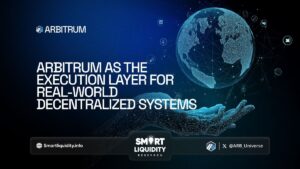The Future of DeFi on Arbitrum


In the rapidly evolving landscape of decentralized finance (DeFi), Arbitrum has emerged as a beacon of innovation, offering scalability and reduced transaction costs for users and developers alike. As the DeFi ecosystem continues to expand, the future of DeFi on Arbitrum presents a compelling narrative, characterized by a myriad of opportunities and challenges.
In this article, we delve into the potential of DeFi on Arbitrum, exploring the opportunities that scalability and interoperability bring, while also addressing the challenges of security, regulatory uncertainty, and fierce competition. By analyzing these dynamics, we aim to paint a comprehensive picture of what lies ahead for DeFi on Arbitrum and how stakeholders can navigate this exciting landscape to unlock its full potential.
Decentralized Finance (DeFi) has emerged as a revolutionary force in the financial world, offering a range of financial services without the need for traditional intermediaries. With its promise of democratizing finance and providing greater access to financial products, DeFi has seen tremendous growth in recent years. Among the platforms driving this growth, Arbitrum has emerged as a key player, offering scalability and lower transaction costs compared to its counterparts. As we look ahead, the future of DeFi on Arbitrum presents a landscape filled with both opportunities and challenges.
Opportunities
- Scalability — One of the key advantages of Arbitrum is its scalability. By utilizing optimistic rollups, Arbitrum can process a larger number of transactions off-chain, thereby reducing congestion on the Ethereum network and improving overall efficiency. This scalability opens up opportunities for DeFi protocols to handle a greater volume of transactions, catering to a larger user base.
- Lower Transaction Costs — High gas fees on the Ethereum network have been a barrier to entry for many users looking to participate in DeFi. Arbitrum’s lower transaction costs make it more accessible to a wider audience, including retail investors and users in emerging markets. This reduction in fees could spur greater adoption of DeFi applications built on the Arbitrum platform.
- Interoperability — Arbitrum is compatible with existing Ethereum smart contracts, allowing for seamless interoperability between the two networks. This interoperability enables DeFi protocols to leverage the existing ecosystem of Ethereum-based assets and applications while benefiting from Arbitrum’s scalability and lower costs. This interoperability could drive innovation and collaboration within the DeFi space.
Challenges
- Security Concerns — As with any emerging technology, security remains a significant concern in the DeFi space. While Arbitrum employs various security measures, including fraud proofs and dispute resolution mechanisms, the risk of smart contract vulnerabilities and security breaches still exists. Ensuring robust security protocols will be crucial to maintaining user trust and confidence in DeFi on Arbitrum.
- Regulatory Uncertainty — DeFi operates in a regulatory gray area, with regulators around the world grappling with how to classify and regulate decentralized financial activities. This regulatory uncertainty poses a challenge for DeFi projects built on Arbitrum, as they navigate complex legal landscapes and potential compliance requirements. Clarifying regulatory frameworks will be essential to fostering innovation while addressing concerns around investor protection and financial stability.
- Competition — The DeFi space is highly competitive, with new protocols and platforms constantly entering the market. While Arbitrum offers scalability and lower transaction costs, it faces competition from other Layer 2 solutions and emerging blockchain networks. Maintaining its competitive edge and attracting users and developers will require continuous innovation and improvements to its technology and user experience.
In Summary
The future of DeFi on Arbitrum holds great promise, with opportunities for scalability, lower costs, and interoperability driving innovation and growth. However, challenges such as security concerns, regulatory uncertainty, and competition must be addressed to realize the full potential of DeFi on Arbitrum. By navigating these challenges effectively and fostering collaboration within the ecosystem, Arbitrum can play a leading role in shaping the future of decentralized finance, unlocking new possibilities for financial inclusion and empowerment.
Disclaimer
“The information provided in this article is for informational purposes only and should not be construed as financial, investment, or legal advice. While every effort has been made to ensure the accuracy and reliability of the information presented, readers are encouraged to conduct their own research and consult with qualified professionals before making any financial decisions or investments.”




